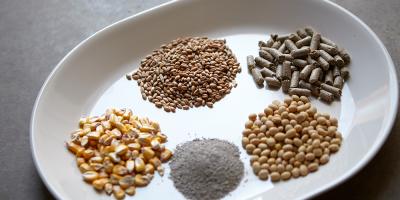On the Farm
How many generations has your family been producing eggs?
There are over 1,000 egg farming families in Canada, and many have been farming for multiple generations.
On the Farm
How do egg farmers take care of their hens?
Our farmers are responsible stewards of their animals and responsible animal husbandry is a top priority. Farmers follow a national Animal Care Program based on a national code of practice. The Code of Practice is developed in consultation with Canada’s top veterinarians, scientists, as well as representatives from the Canadian Federation of Humane Societies, industry and government. Egg Farmers of Canada actively funds independent research at leading universities on welfare and farming practices and we are committed to mobilizing this knowledge throughout the industry. Learn more.
General
What is an egg grading station?
Once eggs have left the farm, they go through the grading station where they are washed, candled, weighed and packed. All grading stations are registered and inspected by the Canadian Food Inspection Agency.
On the Farm
How do egg farmers use technology in their barns?
With the technology that’s available now, there is constant monitoring of feed consumption, barn temperatures and more, along with warning systems in place, but farmers still rely heavily on a daily barn check.
On the Farm
What do egg farmers feed their hens?
Egg farmers work with nutrition specialists to ensure their hens eat a balanced and nutritious diet of grains, protein, fats, vitamins and minerals. And of course, water is always on the menu! A balanced diet is vital for maintaining the hen’s health and also plays an important role in the quality of eggs produced.
Canadian egg farmers follow feed regulations set by the Canadian Food Inspection Agency. Steroids and hormones are not approved for use in Canada. This means that the eggs you buy at the store do not contain steroids or hormones.
On the Farm
What time does an egg farmer's day start and end?
The day on the farm starts when the lights go on in the barn. On Susan Schafers’ farm, this is 6am. Floor eggs at her free run operation are gathered at 7am, which is an opportunity to walk through the whole barn.
Following that, she works on paperwork and record keeping for the national Start-Clean, Stay-Clean™ program and Animal Care Program including water, humidity and temperature checks.
Next up is egg gathering which takes about an hour, followed by a break. A second egg gathering and barn check happens later in the morning, and for the rest of the day the hens can do what they like. A third barn check happens in the afternoon with more record-keeping, and her day ends with a final barn check around 7-8pm.
Nutrition
How many calories are in an egg?
There are 80 calories in a large egg.
Nutrition
How much protein is in an egg?
There are 6.5 grams of protein in a large egg.
Nutrition
Do eggs have carbohydrates?
A serving of two large eggs contains 1 gram of carbohydrate.
Nutrition
Do eggs have complete protein?
Eggs are a source of complete protein, meaning they contain all 9 essential amino acids. “Essential” means that the body can’t synthesize these amino acids on its own, which is why we need to include them in our diet. Amino acids help to form protein in the body.













